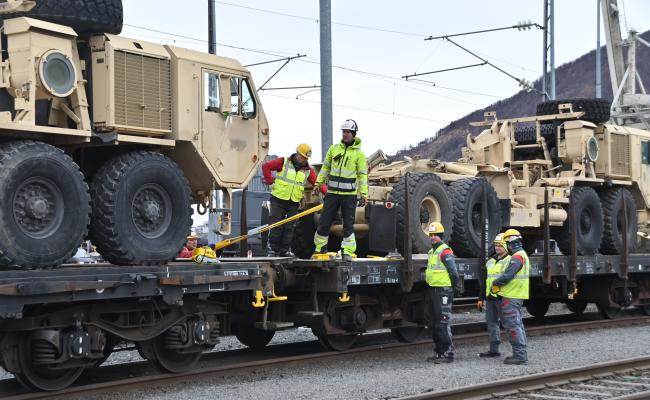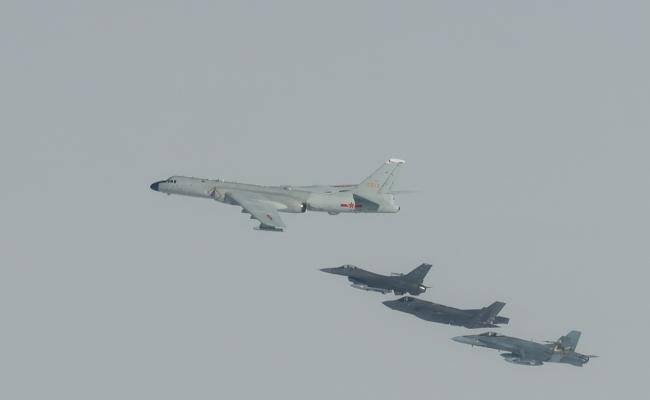The Arendal Week: From Global to Regional: “NATO Has Come Home”
The Norwegian MFA Espen Barth Eide (Labor) during a debate about NATO after the summit in Washington in July. The debate took place during the Arendal Week 2024 under the auspices of the Norwegian Atlantic Committee. (Photo: Trine Jonassen)
Arendal (High North News): Russia's invasion of Ukraine has forced a regionalization of the Nordics in NATO. "NATO has come home to the original tasks," says Norwegian MFA Espen Barth Eide (Labor).
"Similar nations naturally come together to discuss and agree on joint standpoints," says Vice Admiral Louise Dedichen, outgoing leader of the Norwegian Military Representative to NATO in Brussels.
"We see great change with Finland and Sweden in NATO. Nordic countries have their own power now. Geographic and cultural similarities make us agree quickly," says Dedichen.
Together with Trygve Smidt, Lt. Colonel and Researcher at the Norwegian Military Academy, and Karsten Friis, Researcher at the Norwegian Institute of International Affairs (Nupi), as well as MFA Espen Barth Eide (Labor), Dedichen participated in a debate about NATO under the auspices of the Norwegian Atlantic Committee during the Arendal Week.
Sensitive to criticism
The vice admiral says the Nordic countries have been sensitive to criticism after a joint Nordic region entered NATO. The spotlight on a strengthened NATO in the North has been too strong.
Vice Admiral Louise Dedichen is the leader of the Norwegian Military Representative to NATO in Brussels until the end of the year. She participated in a debate about NATO after the summit in Washington during the Arendal Week under the auspices of the Norwegian Atlantic Committee. (Photo: Trine Jonassen)
"However, my job in Brussels has been to promote the High North, although we are also to show interest for what is happening in the south," says Dedichen and emphasizes that the motto "One for all" does not just apply to Article 5 but in everyday life.
"What concerns NATO concerns all members."
Other directions
Yet, the fact is that the Finnish and Swedish memberships require new planning.
"We must think in other directions," says the vice admiral.
Security researcher Karsten Friis believes that a strong Nordic region benefits everyone.
The Norwegian Navy is too small and has too few ships.
Too weak
"If we can combine our defenses in a joint Nordic region, we will have a better defense. And we need a better naval defense," says Friis.
He believes a united Nordic region is strong enough to resist a Russian land attack in the North. But only if the long-term defense plan, which was presented in April, is realized.
"The Norwegian Navy is too small and has too few ships. We do not have enough people to occupy critical functions to sail, and we have created such difficult systems for staffing that it takes too long. Everything was to be streamlined and down-scaled. But now it is about being ready," says Dedichen.
The entire Cap of the North
Friis also believes that the Cap of the North will benefit from being under the same NATO command. Currently, Finland, Sweden, and Denmark are under the Brunssum headquarters in the Netherlands. Iceland and Norway are under the quite newly established NATO command Joint Force Command Norfolk in the US.
"Norfolk should cover the entire Cap of the North. It makes sense. It is unthinkable to cover Finnmark without the entire Cap of the North militarily," says the researcher.
Also read
Friis believes it is the right move for the Nordics to join forces in a regionalization.
Without regional focus
"For a while, NATO was without regional focus. Almost nothing happened north of Oslo. Many Western European countries thought it strange when we entered a regional initiative. There were no longer wars in our immediate areas," says Norwegian MFA Espen Barth Eide (Labor).
For a number of years before 2008, NATO focused on operations at a strategic distance, such as in Afghanistan. This contributed to an impression of NATO as primarily an organization that ran operations in distant areas. The regional initiative aimed to point out the need to address NATO tasks to their full extent, also within our own geographical areas.
"We meant that the peace in our immediate areas could not be taken for granted. When Russia attacked Georgia (January 2008, ed. note), we thought this was a preview of what happened in Ukraine," says the MFA.
Karsten Friis, Researcher at the Norwegian Institute of International Affairs (Nupi) during the Arendal Week. (Photo: Trine Jonassen)
"We did not believe the established truth of all wars being far away and asymmetrical."
Successful summit
Espen Barth Eide calls the recent summit in Washington successful and "a manifestation of NATO having come home to its core task," hindering Russian expansion.
"902 days have passed since the war. The most important thing for Norway's security is how things turn out in Ukraine. In Washington, NATO appeared united with a clear American leadership. NATO is now more united in the response to Ukraine," says the MFA.
"We must now assume a leading role in the Nordic region. We must take responsibility for Sweden and Finland becoming an integrated part of the Baltic community. We discover the Baltic region, and they discover the Murmansk region. They must learn about the Kola Peninsula, and we must learn about the Baltic Sea. NATO stretches from the Barents Sea to the Baltic Sea, which has become an ocean through NATO. And Leningrad Military District is now our shared neighbor.
Self-imposed restrictions
But will Sweden and Finland match Norway's self-imposed restrictions and base policy?
It is problematic to accept Ukraine during the war with Russia.
"Finland has not declared a base policy. But they do not have the opposite either. Our restrictions are self-imposed and self-interpretable. They are sensible and are consistently interpreted to our situation," says Barth Eide cryptically.
According to NATO's declaration after the summit, Ukraine's path toward membership is not "irreversible." That means NATO will support Ukraine on its "irreversible path toward NATO membership" without determining when this will happen. The wording is not a formal invitation, either.
Problematic
The problem with formally inviting Ukraine into NATO is that NATO wants to avoid importing a war into the alliance.
"It is problematic to accept Ukraine during the war with Russia because we are collectively committed to a joint defense. We offer Ukraine a future membership. However, Ukraine is fighting a battle for the European security and the UN Charter. This our battle as well," says the MFA.
The NATO summit's attitude to Ukrainian membership is too weak, says Researcher Jan Friis at the Norwegian Institute of International Affairs (NUPI).
Also read
Protection against Trump
"A formal offer of NATO membership to Ukraine cannot be undone, and we should have offered them membership at the NATO summit. That would not mean that we would go to war with Russia, but that Trump cannot take it back if he is elected president on November 5th," explains Friis.
He fears that it could be too late if it comes later.
"Putin wants to make Ukraine a "fail state," a state that Russia has messed up with mafia and corruption to the point that Ukraine is no longer a functioning country."
Should have done more
Vice Admiral Louise Dedichen supports Friis and believes Ukraine should have been formally invited into NATO.
"It would also be good news for NATO in a military context, considering money and commitment. The declaration should have done more. Particularly considering the Economist recently named Norway the richest country in the world. Considering the claim that Ukrainian security is linked to Norway's security, Norway should be doing more," says Dedichen.
MFA Espen Barth Eide specifies that NATO's border with Russia in the North is stable.
The Arctic is of great significance.
Unsettled areas
"The war in Ukraine is about so-called 'unsettled areas.' We must have a relationship with Russia. We share a border, fisheries cooperation, and large parts of the Arctic with them. Long after they attacked Georgia and invaded Crimea, we managed to maintain cooperation. But after the war in Ukraine, the Barents cooperation was over."
He emphasizes that the Arctic is not a disputed area. There are no disputes, the borders are clear, and the Law of the Sea applies, also to Russia.
"But the Arctic is of great geopolitical significance, with Russia's strategic nuclear weapons placed on the Kola Peninsula."
Returned home
"There are no conflicts in the Arctic, but the Arctic will have great significance in the event of a war. At the same time, we see increased GPS jamming and acquisitions of businesses and holiday cottages. There are new ways to influence us, and we have become more aware of this. Understanding hybrid threats is now part of NATO," says the MFA.
"NATO has returned home to its main task again, which is much more than land now. Before, you knew if you were at war. It is not as visible now. We must think about security regarding sea cables and energy now. I hate to say it, but ex-president Ronald Reagan was right," smiles Barth Eide.
Reagan was skeptical of the dependency on Russia's energy. Now, Putin has essentially accelerated the EU's green shift, the Green Deal.
"Norway does not have enough gas to replace the whole after Russian gas, so the whole of Europe must step up."
And with an increasingly controversial China, globalization is being dialed back.
"We see more cooperation in regional blocs. We are going from global to regional," concludes Espen Barth Eide.






